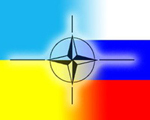Kyiv, November 7 The First Ukraine – Russia – NATO Forum “Cooperation with NATO: Benefits for Ukraine and Russia” brought together leading Ukrainian, Russian and European experts to discuss a new vision of the relations between Kyiv, Moscow and NATO.The Forum was organized by the Institute of World Policy in partnership with Moscow Carnegie Center and co-supported by NATO Information and Documentation Center in Ukraine and NATO Information Office in Russia.
The main goal of the gathering was to provide for a permanent trilateral discussion arena. It will facilitate going beyond the Cold-War-era stereotypes and finding approaches that would enable the three sides to move from a dialogue plagued by suspicion to a partnership beneficial for all.
“Surely the quest for understanding in the Ukraine – NATO – Russia triangle requires considerable effort,” Alyona Getmanchuk said, the Director of the Institute of World Policy. “And the results of such policy will hardly be noticeable form a short-term perspective. However, this partnership can become the best strategic investment in the security of Ukraine as well as the whole region. Although Ukraine and Russia see NATO differently, there are many aspects where our views coincide, indeed.”
Russia was represented by leading researchers Tatyana Parkhalina and Dmitriy Danilov; Scholar-in-Residence at Moscow Carnegie Center Andrey Ryabov, former Russian BBC Service Chief Konstantin Eggert and many others. The geographical span of the Russian participants was as wide as from Kaliningrad to Volgograd. The leading British expert on Post-Soviet countries Keir Giles presented a view from Western Europe.
The event’s panel discussions were moderated by such renowned TV hosts as Yevgeniy Kiselev, Mykola Veresen’ and Sergey Dorofeyev.
The Forum is expected to become an annual gathering.
{1}
{2}
The Forum was opened by Viktor Shlinchak, Chair of the Supervisory Board of the Institute of World Policy, Nataliia Nemyliwska, director of the NATO Information and Documention Center in Ukraine, Robert Pszczel, director of the NATO Information Office in Russian Federation
{3}
Participants of the 1st Panel Discussion NATO-Russia-Ukraine: Win-Win-Win Game
{5}
Mikhaylo Pohrebynskiy, director Kyiv center for Political and Conflict Studies
{4}
PANEL DISCUSSION 2: 3D Security Format: NATO-Russia-Ukraine Cooperation Influence on Regional Stability and Security,
Moderator: Sergey Dorofeev, TV Presenter, Channel 5, Belarus/Ukraine; Dmitriy Danilov, Director, European Security Studies, Russia; Oleg Kokoshinsky, Vice-President of Atlantic Council of Ukraine, Ukraine;
Igor Chernov, Director, Information Centre for International Security, Volgograd, Russia;
Grygoriy Perepelytsia, Director, Institute of Foreign Policy, Ukraine; Boris Kuznetsov, Director, Centre for International and Regional Policy, Russia
{6}
Roland Kovats, Chief of Party, Ukraine National Initiatives to Enhance Reforms (UNITER)
{7}
PANEL DISCUSSION 3: NATO not in Black and White: Overcoming Ukrainian and Russian Stereotypes Together,
Moderator: Mykola Veresen’, Journalist, Ukraine;
Konstantin Eggert, Publicist, Russia; Tatiana Parkhalina, Director of the Centre for European Security, Russia; Ihor Todorov, Deputy director, Centre of International Security, Donetsk, Ukraine; Serhiy Dzherdzh, Head, NATO-Ukraine Civic League, Ukraine;
{15}
Mykola Veresen’
{11}
Konstantin Eggert
{9}
Konstantin Eggert, Tatiana Parkhalina, Mykola Veresen’
{12}
Volodymyr Horbach, analyst of the Institute of Euro-Atlantic Cooperation
{16}
Kateryna Zarembo, deputy director of the Institute of World Policy was a moderator of the fourth Panel Discussion “Ukraine-Russia-NATO: Views from Successor Generation”
{17}
Anton Morozov, assistant professor of the St. Petersburg State University for Service and Economics, Russia
{18}
Alexey Kiselyov, director Center for Social-Poltical Studies, Krasnodar, Russia
{7}
{8}
Concluding remarks by Alyona Getmanchuk, director of the Institute of World Policy, Natalia Nemyliwska and Robert Pszczel
Photo by Natalia Sagalata and Stanislav Tkachov




Comments theme
Comments themeComments themeComments themeComments themeComments themeComments themeComments themeComments themeComments themeComments themeComments themeComments themeComments themeComments themeComments themeComments themeComments themeComments themeComments themeComments.